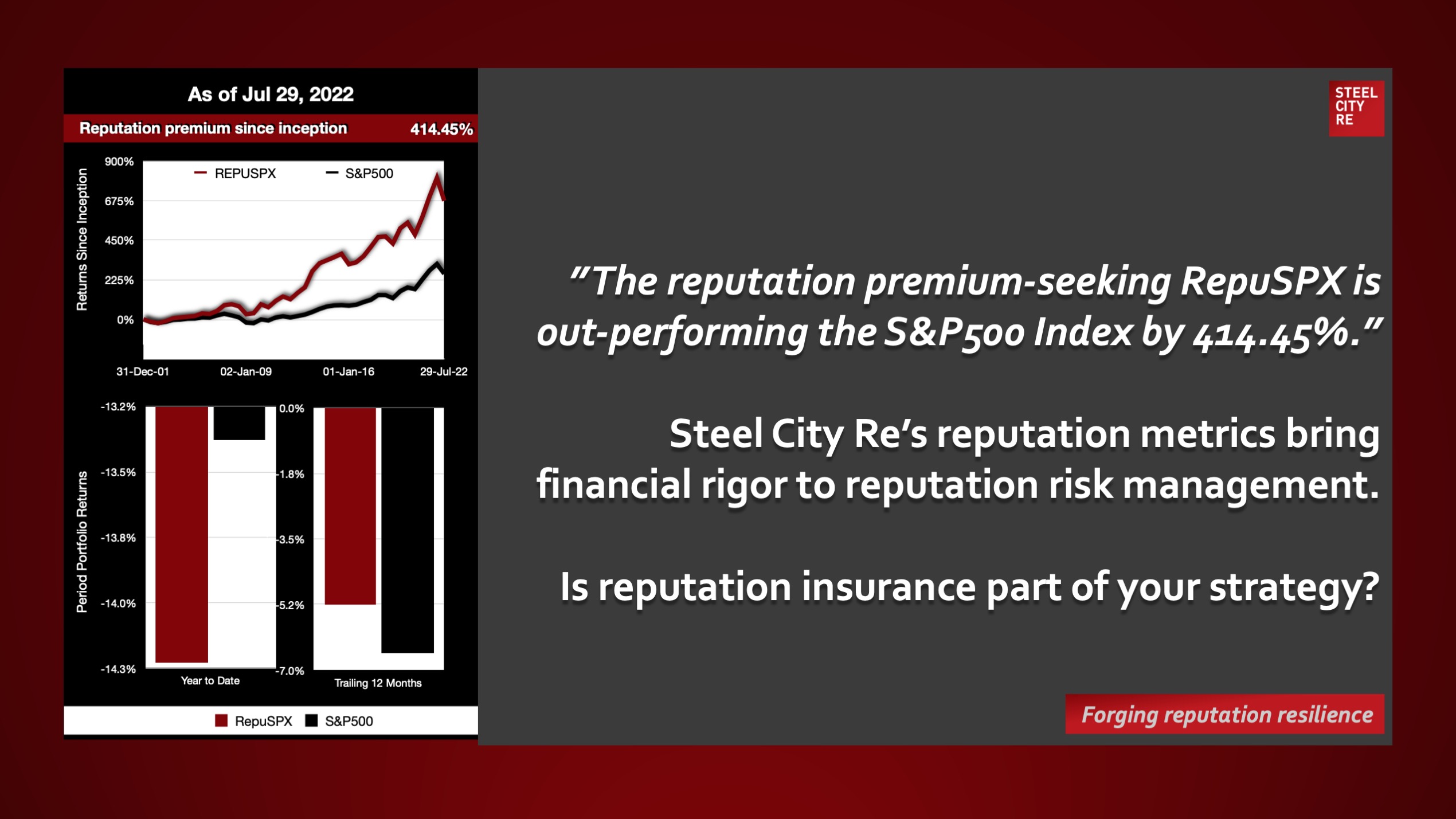Reputation premium and arbitrage. “As of July 29, 2022, the RepuSPX premium-seeking equity portfolio, based on the same metrics used for parametric reputation insurance, is out-performing the S&P500 Index by 414.45%.”
July 30, 2022
RepuStars
Reputation premium and arbitrage. Companies harness their reputation to sell more, faster, and at premium prices; and to obtain labor, vendor services, as well as capital on preferred terms. Enhanced reputational value can help companies outperform competitors, recruit and retain talent, deter activists, and satisfy regulators.
Steel City Re mitigates the hazards of ESG (reputation) risk that threaten reputation value through parametric reputation insurances, ESG insurances, and risk management advisory services.
Our services feature two unique tools. Our quantitative advantage is a system of measures of for reputational value that has been validated in equity markets. Our qualitative advantage is a behavioral economic framework that helps our clients prevail in the battle for the mind of their stakeholders. These features are products of our own thought leadership.
We identify gaps in oversight, management, and insurance for ESG | reputation issues. We help clients structure a cross-silo function to (a) gather intelligence on shifts in stakeholders’ expectations; (b) articulate an enterprise risk management strategy for observed shifts; and (c) execute the above under controls for compliance, regulatory pitfalls, and litigation pitfalls.
Last, we help clients authenticate the above by using captives and risk transfer to provide both Caremark post Marchand resilience for boards and economic benefits for shareholders as described in the governance, risk, and legal literature; and in a video on products and services.
Risk management, risk financing in insurance captives, and risk transfer through reputation insurances comprise the constituent elements of a comprehensive reputation risk governance and management solution. These basic videos explain why and how; and the basis for reputation premium and arbitrage strategies.
Context and Background
Risk managers are now central to the process for managing risks to reputation and that’s a process marketers and communications professionals need to be a part of. The oversight of reputation risk management is mission-critical.
Courts have increasingly ruled that reputation is a mission critical function and oversight of its management is a duty of the board of directors. Courts are also ruling that marketing statements companies make – if they related to issues that affect their reputation, like ESG – may be considered material by investors. Litigation along these lines has yielded large settlements or verdicts for plaintiffs.
And now, the SEC has proposed new rules requiring disclosures by public companies related to their ESG activities; those statements could become a communications and reputational minefield.
As a result, reputation risk management is evolving into an intelligence gathering operation spanning the entire enterprise, roping in the enterprise risk manager, compliance counsel, and increasingly, reporting up to the Chief Legal Officer. There is a growing recognition that reputation is not a product merely of marketing and media coverage, but of the degree to which stakeholders’ expectations are aligned with actual performance. The reputation risk management process requires a thorough and ongoing analysis of stakeholder expectations, the risks of disappointment, and a plan for either managing those expectations or assessing and insuring against the cost of failure.
One Last Question
Are ESG insurance and reputation insurance part of your strategy?

